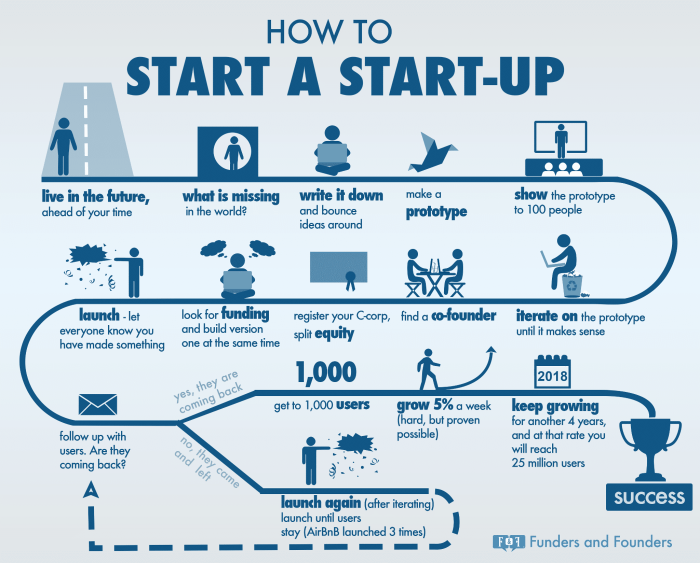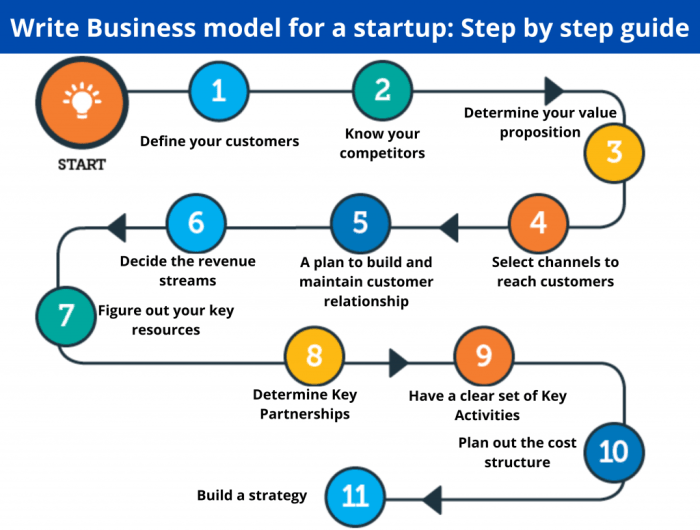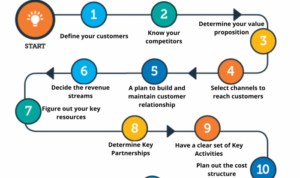Building a Startup Business sets the stage for this enthralling narrative, offering readers a glimpse into a story that is rich in detail with American high school hip style and brimming with originality from the outset.
Get ready to dive into the world of entrepreneurship and discover the key steps to turning your innovative idea into a successful business venture.
Overview of Building a Startup Business
Startup businesses are newly established companies designed to develop a unique product or service in the market. These businesses are characterized by innovation, agility, and a high growth potential.
Building a solid foundation for a startup is crucial for its long-term success. This includes having a clear business plan, a strong value proposition, a scalable business model, and a talented team to execute the vision.
Starting a new business comes with various challenges and risks, such as financial constraints, market competition, regulatory hurdles, and uncertainty in consumer demand. Entrepreneurs must navigate these obstacles strategically to ensure the survival and growth of their startup.
Developing a Business Idea
Starting a new business begins with a great idea that solves a problem or fulfills a need in the market. Here are some methods for generating innovative business ideas:
Brainstorming Sessions
Brainstorming with a team or even by yourself can lead to unique and creative business ideas. Encourage thinking outside the box and exploring different perspectives.
Identifying Pain Points
Pay attention to common challenges faced by people in their daily lives. Solving these pain points can be the foundation for a successful business idea.
Market Trends Analysis
Stay updated on current market trends and identify gaps or opportunities that can be leveraged to create a new business. Trends in technology, consumer behavior, and social movements can inspire innovative ideas.
Validating a Business Idea
Once you have a business idea, it’s crucial to validate its feasibility and potential for success. This involves conducting market research and gathering feedback from potential customers to ensure there is a demand for your product or service.
The Importance of Market Research
Market research plays a vital role in shaping a business idea by providing valuable insights into consumer preferences, competitor analysis, pricing strategies, and market trends. It helps entrepreneurs make informed decisions and adapt their business idea to meet the needs of their target market.
Creating a Business Plan
Creating a solid business plan is essential for any startup looking to succeed in the competitive business world. It serves as a roadmap that Artikels the goals, strategies, and financial projections of the business. A good business plan not only helps in setting a clear direction for the company but also plays a crucial role in attracting investors and securing funding.
Key Components of a Comprehensive Business Plan
- Executive Summary: A brief overview of the business idea, goals, and strategies.
- Company Description: Detailed information about the company, its mission, and vision.
- Market Analysis: Research on the target market, competitors, and industry trends.
- Organization and Management: Structure of the company and roles of key team members.
- Product or Service Line: Description of the products or services offered by the business.
- Marketing and Sales Strategy: Plans for reaching and attracting customers.
- Financial Projections: Revenue forecasts, expenses, and break-even analysis.
- Funding Request: Amount of funding needed and how it will be utilized.
- Appendix: Additional documents, such as resumes, permits, and legal agreements.
Significance of a Business Plan for Securing Funding
A well-written business plan is often the first thing investors look at when considering funding a startup. It demonstrates that the entrepreneurs have a clear understanding of their business and have thought through all aspects of its operations. Investors use the business plan to assess the viability of the business idea, the potential for growth, and the likelihood of a return on their investment.
Setting Realistic Goals and Milestones in a Business Plan
- Define Specific Goals: Clearly Artikel the objectives that the business aims to achieve in the short and long term.
- Set Measurable Milestones: Break down the goals into smaller, measurable milestones that can be tracked and evaluated.
- Be Realistic: Ensure that the goals and milestones set are achievable based on the resources and capabilities of the business.
- Review and Adjust: Regularly review the progress towards the goals and milestones, and make adjustments as needed to stay on track.
Building a Strong Team

Building a startup team is crucial for the success of your business. You need to find individuals who not only have the right skills but also share your vision and passion for the project.
Qualities to Look for in Team Members
- Passion: Look for team members who are passionate about the project and are willing to go the extra mile to make it a success.
- Adaptability: In a startup environment, things can change rapidly. It’s important to have team members who can adapt quickly to new situations.
- Strong Work Ethic: Building a startup requires hard work and dedication. Make sure your team members are willing to put in the effort needed.
Importance of Diversity in a Team
Having a diverse team with complementary skills is key to building a successful startup. Different perspectives and backgrounds can lead to more creative solutions and better decision-making.
Strategies for Team Communication and Collaboration
- Regular Meetings: Schedule regular team meetings to keep everyone informed and on the same page.
- Use Collaboration Tools: Utilize tools like Slack, Trello, or Google Docs to facilitate communication and collaboration.
- Encourage Open Communication: Create a culture where team members feel comfortable sharing ideas and providing feedback.
Securing Funding

Securing funding is a crucial step in building a startup business. It can help you cover initial costs, scale your operations, and bring your innovative ideas to life. In this section, we will explore different sources of funding, compare bootstrapping with seeking external funding, and discuss tips for pitching to investors.
Sources of Funding
When it comes to funding your startup, there are various sources you can explore. Some common options include:
- Venture capital firms
- Angel investors
- Crowdfunding platforms
- Bank loans
- Government grants
Bootstrapping vs. External Funding, Building a Startup Business
Bootstrapping involves funding your business using personal savings or revenue generated by the business itself. On the other hand, seeking external funding means getting financial support from investors or lenders. Here are the pros and cons of each approach:
- Bootstrapping:
- Pros: Maintaining full control, no equity dilution, and less pressure from external investors.
- Cons: Limited resources, slower growth potential, and higher personal financial risk.
- External Funding:
- Pros: Access to larger funding amounts, expertise from investors, and potential for rapid growth.
- Cons: Equity dilution, loss of control, and pressure to meet investor expectations.
Pitching to Investors
When pitching to investors, it’s essential to be prepared and make a compelling case for why they should invest in your startup. Here are some tips to increase your chances of securing funding:
- Clearly communicate your business idea, target market, and unique value proposition.
- Demonstrate traction, such as customer testimonials, revenue growth, or product development milestones.
- Show a solid business plan with financial projections and a clear path to profitability.
- Highlight your team’s expertise and passion for the project.
- Be open to feedback and willing to negotiate terms that are mutually beneficial.
Marketing and Branding Strategies
Branding is crucial for a startup business as it helps establish a unique identity, build credibility, and differentiate the business from competitors. It also helps in creating a loyal customer base and increasing brand recognition in the market.
Importance of Branding
Branding plays a vital role in the success of a startup business by:
- Creating a strong first impression on customers
- Building trust and credibility
- Setting the business apart from competitors
- Attracting the right target audience
Marketing Strategies for Brand Awareness
To create brand awareness, startups can implement various marketing strategies such as:
- Utilizing social media platforms for advertising and engaging with customers
- Collaborating with influencers or brand ambassadors to reach a wider audience
- Implementing content marketing strategies like blogging, videos, and podcasts
- Participating in events, trade shows, or sponsorships to increase visibility
Identifying and Targeting the Right Audience
Identifying the right target audience is essential for a startup to ensure effective marketing efforts. Ways to target the right audience include:
- Conducting market research to understand customer demographics, preferences, and behavior
- Creating buyer personas to tailor marketing messages and strategies
- Utilizing data analytics to track and analyze customer interactions and engagement
- Testing and optimizing marketing campaigns to reach the most responsive audience segments
Scaling and Growth: Building A Startup Business
Scaling a startup business comes with its own set of challenges and opportunities. It involves expanding your operations, reaching new markets, and increasing your customer base.
Challenges in Scaling
- Managing Increased Workload: As your business grows, you’ll need to handle more tasks, projects, and employees efficiently.
- Ensuring Consistent Quality: Maintaining the same level of quality in your products or services becomes crucial as you scale up.
- Balancing Costs: Scaling often requires more resources, so managing costs while expanding is a delicate balance.
- Adapting to Change: The market and consumer demands evolve, so staying flexible and adaptable is key to successful scaling.
Strategies for Growth
- Investing in Technology: Utilizing the right tools and technology can help streamline processes and improve productivity.
- Building Strategic Partnerships: Collaborating with other businesses can open up new opportunities and markets for growth.
- Focusing on Customer Feedback: Listening to your customers and incorporating their feedback can guide your growth strategy effectively.
- Continuous Innovation: Staying ahead of the competition by innovating and introducing new products or services keeps your business relevant in a growing market.
Balancing Growth and Sustainability
It’s essential to strike a balance between scaling your business and ensuring its long-term sustainability. Rapid growth can lead to challenges such as overextending resources or compromising quality. By focusing on sustainable growth practices, you can build a strong foundation for your business’s future success.





